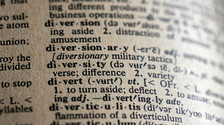azahrah.qolbaina
what the things that make verb 2 and verb 3 different
I was confised by verb 2 and verb 3. Can you explain it?
16 mars 2012 11:16
Réponses · 3
What is verb 1?
16 mars 2012
It sounds like you're asking about patterns like "see - saw - seen", or (Brad's example) "go - went - gone".
Basically, the past participle ("verb 3") always needs a helping verb. Always. It can't function without one. So you can say "I have seen" or "it is gone", but "it gone" and "I seen" are completely wrong; you need "it went" and "I saw" (simple past) in these cases.
You use the past participle in perfect tenses (I have seen; I had eaten; I will have spoken), hypothetical forms using "have" (I should have known; it could have sunk), or passive forms (it is known; that was eaten).
Verb 2 (past simple) is the basic past tense of the verb.
16 mars 2012
Are you talking about the simple past (e.g., "went") vs. the past participle (e.g., "gone")?
16 mars 2012
Vous n'avez pas encore trouvé vos réponses ?
Écrivez vos questions et profitez de l'aide des locuteurs natifs !
azahrah.qolbaina
Compétences linguistiques
Arabe, Anglais, Indonésien, Turc
Langue étudiée
Arabe, Anglais, Turc
Articles qui pourraient te plaire

Top 6 Mistakes to Avoid with Vocabulary Acquisition
38 j'aime · 10 Commentaires

Navigating Your First Job: Do's and Don'ts in the Workplace
47 j'aime · 21 Commentaires

What Content to Watch to Acquire Advanced-level Proficiency
79 j'aime · 50 Commentaires
Plus d'articles
